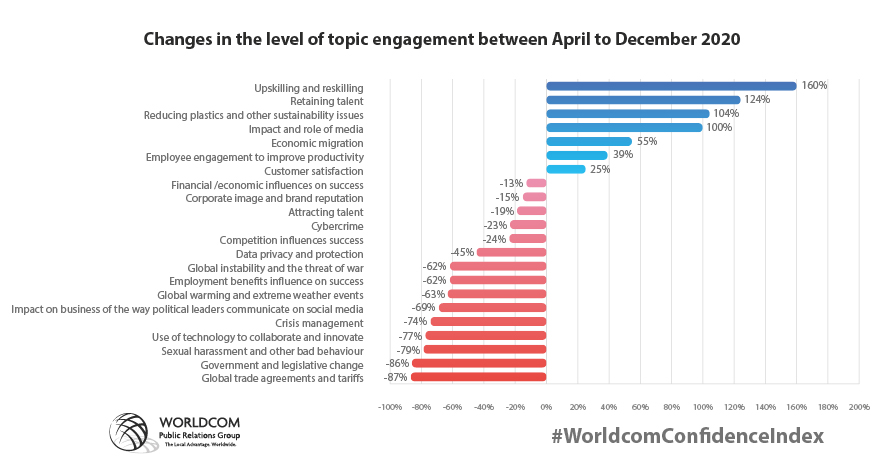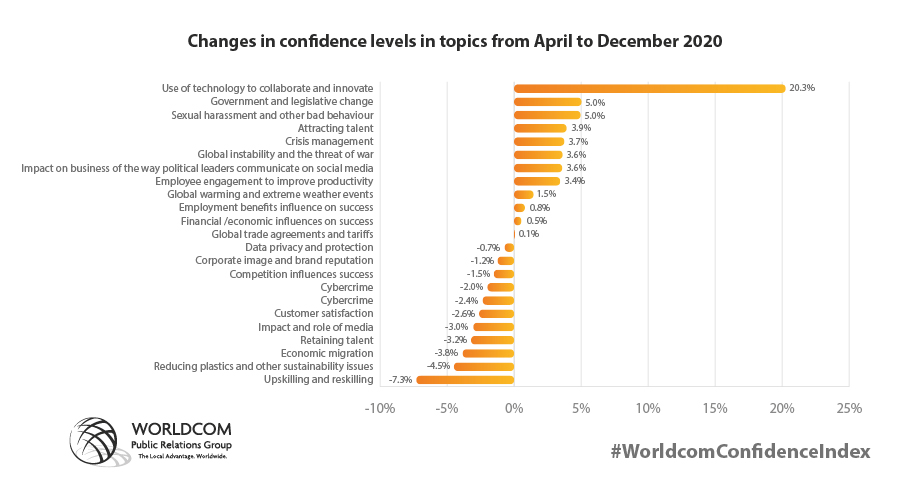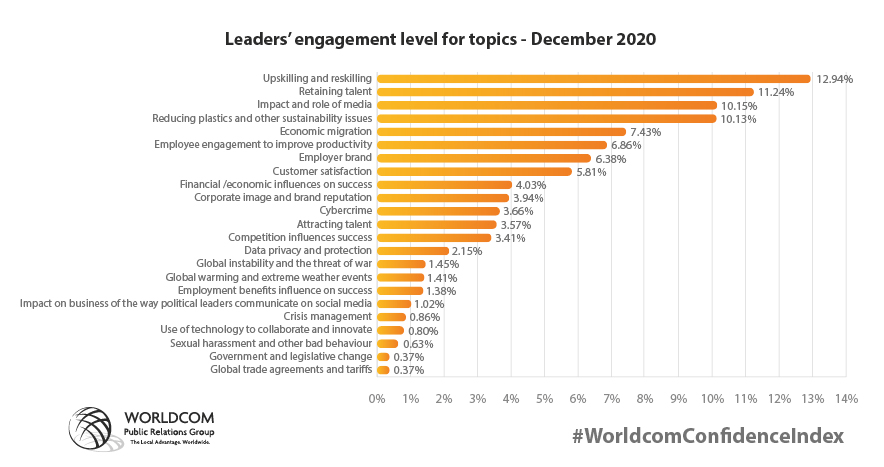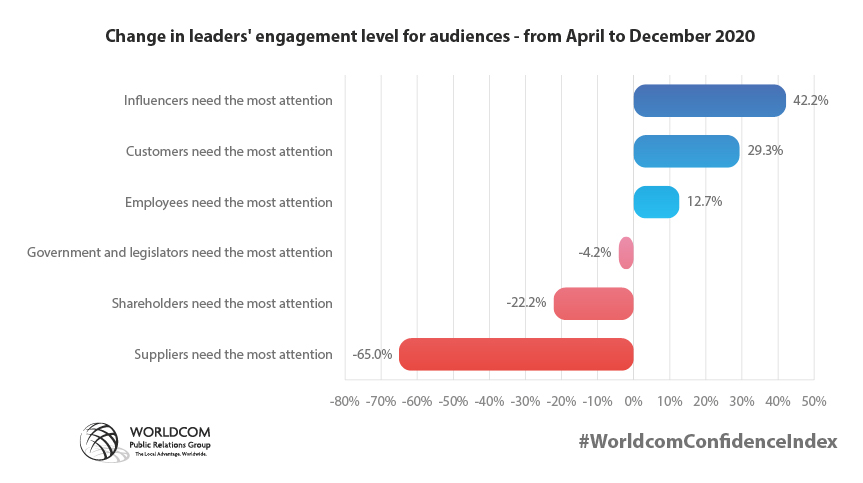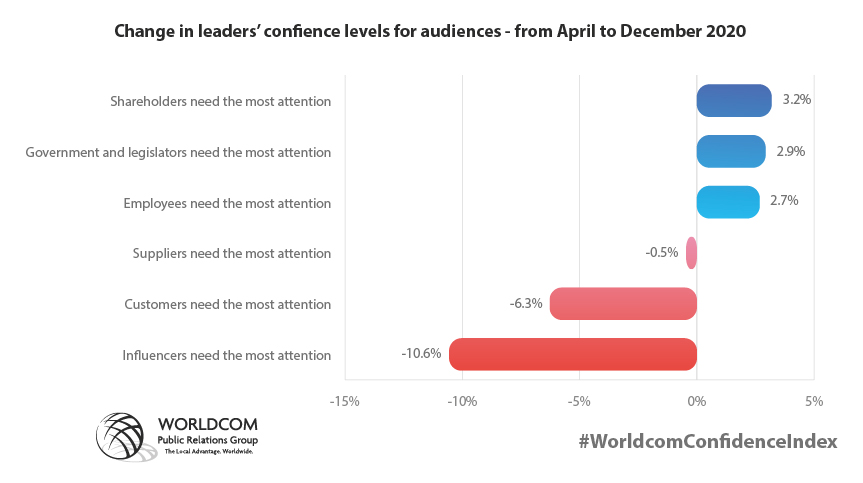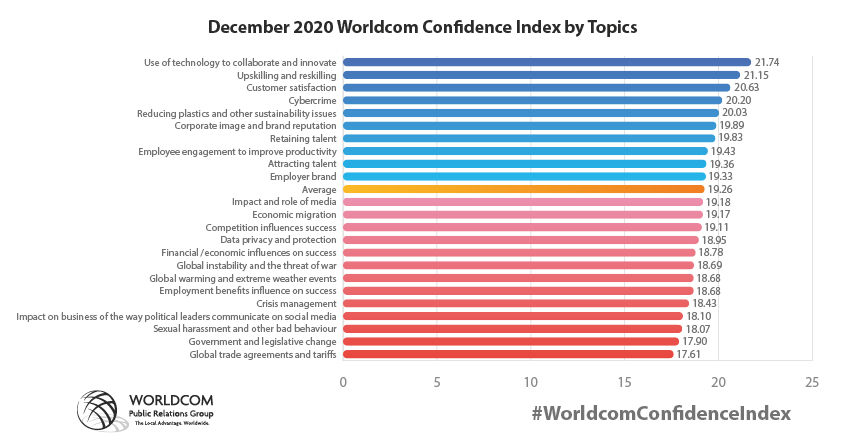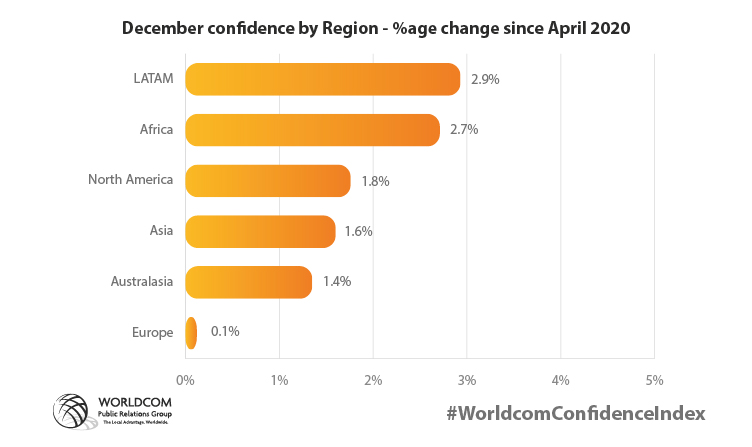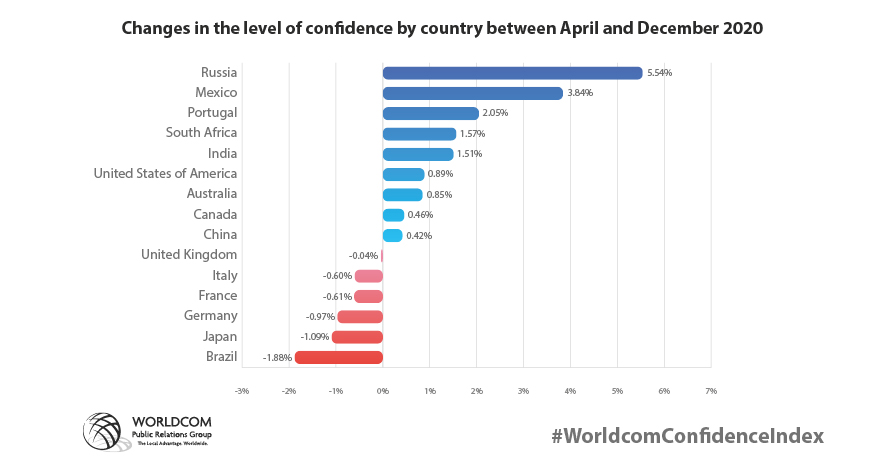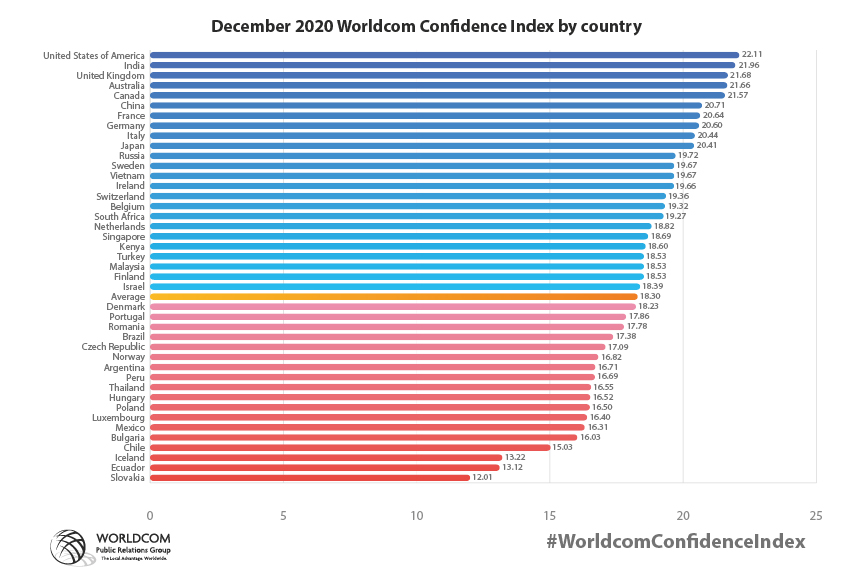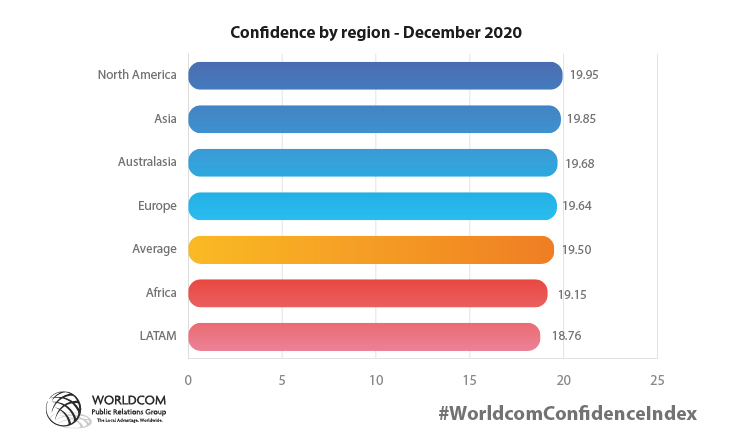December 2020 Global Results
9 Months of the Pandemic
In April 2020 the Covid-19 pandemic really began to take hold everywhere in the world. So, this month’s Worldcom Confidence Index* insight, compares how nine months of the global pandemic has impacted on what global leaders are thinking and their confidence levels in dealing with the topics getting their attention.
The insight draws on data comparisons between April and December 2020, the first month when viable vaccines seemed to offer a light at the end of the Covid-19 tunnel.
*The Worldcom Confidence Index (WCI) is a living study that uses a breakthrough approach powered by artificial intelligence (AI), which allows us to discover the issues that concern leaders globally – and their confidence levels in addressing them. Topics and sentiments are drawn from online conversations of over 54,000 CEOs and CMOs around the world.
1. With one eye on the future, leaders increase their focus on their people
The stand-out change over the nine months from when COVID-19 became a global pandemic is the significant increase in business leaders’ engagement with employee-related issues. In fact, of the seven topics that saw increases in attention, four are people related. Upskilling and reskilling is now the topic that the 54,000 leaders in the ongoing WCI study engage with most in the online content they post (up 160%) – showing that leaders have identified that future success will be based on a workforce that has the skills to work effectively in the post-pandemic world. Upskilling is the #1 topic in every region of the world except LATAM, where the impact and role of the media has most attention.
Increased attention did not translate into increased confidence in the ability to upskill. In fact, this topic has the biggest decrease in confidence since April – down 7.3%. The size of the challenge is highlighted by the World Economic Forum’s latest Future of Jobs Report which identifies that half of all employees around the world will need reskilling by 2025. However, this article from the World Economic Forum also highlights the opportunity that reskilling creates and estimates that greater private-public collaboration on large-scale upskilling and reskilling initiatives could boost global GDP by $6.5 trillion and lead to the creation of 5.3 million net new jobs by 2030.
Retaining talent, the #2 topic for leader attention, has the second largest increase, up 124%. This shows that leaders are focused on retaining their best talent at a time when many people have reassessed what they want from their work life. Like reskilling, increased attention did not translate to increased confidence, which fell 3.2%.
The other two people-related topics that gained more attention are economic migration (up 55%) and employee engagement to improve productivity (up 39%). The need to engage employees, especially those working entirely from home, is highlighted in this research from Gallup. The study shows that employee burnout is a key issue that will need addressing.
2. The attention on environmental and sustainability issues more than doubles
The decision by the Biden administration to re-join the Paris Agreement on climate change seems to be in sync with the attention global leaders are giving to environmental and sustainability issues. Reducing plastics and other sustainability issues increased 104% in engagement (#4 on engagement list). However, confidence in the topic had the second largest fall since April, down 4.5%. As predicted by Worldcom’s experts, sustainability will be of greater importance in 2021 and leaders will need to ensure they have a clear strategy for communicating their approach.
3. Engagement with the impact and role of the media doubles
Although the impact and role of the media fell from #1 to #3 on the leaders’ engagement list, leaders’ engagement with the topic has doubled since April – up exactly 100%. Confidence in handling the media fell by 3% over the period – the fifth largest confidence fall for a topic. As media attention shifts from how governments are responding to the pandemic, it will be vital the business leaders are prepared for increased levels of media scrutiny. This will present opportunities to demonstrate leadership and a progressive attitude to the recovery.
The impact of the media and how it is consumed has changed dramatically since April. This article from Nielsen charts the shape and scale of these changes in the early part of the pandemic. It shows why leaders need to be alert to new shifts as the world, and consumers, emerge from the pandemic.
4. Influencers see surge in leader attention but a slump in leader confidence
Working out which audiences to give attention to has been a key question for leaders during the pandemic. And the conclusions they drew are unequivocal. The attention levels for influencers, customers and employees all increased since April.
Influencers saw the biggest increase (up 42.2%). But leaders’ confidence in dealing with them fell by 10.6%.
Leaders also increased their focus on customers – up 29.3% since April. Confidence in meeting changing customer needs and expectations fell by 6.3%.
Getting communications right for both groups will be critical to an effective recovery. Worldcom’s experts made a number of predictions about which approaches would be critical to success in 2021. These embrace a variety of techniques from experiential marketing to direct to consumer and digital communications. They also highlight the increased need to ensure communication is thoughtful, sensitive and human.
5. Nine months of remote working has built confidence in the ability to use technology to advantage
The pandemic has proven the proverb: necessity is the mother of invention. In April, leader confidence in the use of technology to innovate and collaborate sat at #18 on the Worldcom Confidence Index. By December this topic had risen to #1 on the WCI.
The overnight shift to remote working, and the way organizations were able to rely on technology to do so, perhaps proves the resilience and agility of the global workforce. The recovery from the pandemic will require a similarly agile approach. This article from McKinsey highlights the role of employees. It recommends leaders ‘solicit employees for ear-to-the ground insights. Worldcom’s experts recommend organizations use employee innovation to satisfy new needs. This free survey enables organizations to assess the effectiveness and agility of its employee innovation processes.
6. European leaders see biggest relative decline in confidence
Although global confidence levels recovered slightly between April and December (up 1.7%), the confidence of leaders in Europe saw the biggest decline relative to their peers in other regions.
In fact, the confidence of leaders in three of Europe’s members of the G7 (France, Germany, Italy) all declined.
Confidence in the UK was static.
As a result, Europe dropped from being the world’s most confident region in April to the #4 region in December, behind North America, Asia and Australasia.
~
Artificial Intelligence provides unrivalled view of trending topics and leaders’ confidence and concern in addressing them
The Worldcom Confidence Index is able to operate at this scale, and in nine different languages, because the data is captured using a breakthrough approach powered by artificial intelligence (AI). This allows us to discover the issues that concern leaders – and their confidence levels in addressing them. The chosen research firm, Advanced Symbolics Inc. (ASI), has developed a patented method of building representative samples and then capturing information with their AI tool. By using ASI’s AI tool, we have produced a truly global perspective on the business issues of the moment and where they rank in terms of leadership attention. We’ve also calculated the confidence index level for every topic and audience and identified how this changes for 42 countries around the world. This is incredibly valuable insight because it not only represents what leaders are talking about, rather than responses to questions, but also shows their confidence or concern in addressing each topic. It means you can compare your own thoughts with more than 54,000 of your global peers.

